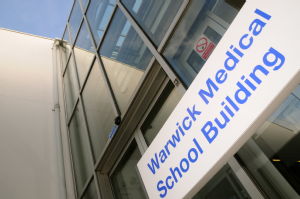GROUND-BREAKING University of Warwick research has shown using adrenaline during a cardiac arrest doubles the risk of ‘severe brain damage’ for survivors.
The research conducted by Warwick Medical School has sparked a debate about the future usage of adrenaline.
A clinical trial – including 8,000 patients – showed that while chances of survival were slightly improved, chances of being left severely disabled were almost doubled.
Each year 30,000 people sustain a cardiac arrest in the UK and less than one in ten survive.
A cardiac arrest means the heart has stopped pumping blood around the body.
The study recognised the most effective way to treat cardiac arrests is to administer CPR (cardiopulmonary resuscitation) or defibrillation (electric shock treatment).
The study found adrenaline – which is only used as a last resort – increases blood flow to the heart, increasing the chance of restoring a heartbeat.
But it also reduces blood flow in very small blood vessels in the brain, which may cause brain damage.
Observational studies, involving over 500,000 patients, have reported worse long-term survival and more brain damage among survivors who were treated with adrenaline.
The research was led by the University of Warwick’s Clinical Trials Units – part of Warwick Medical School.
Gavin Perkins, professor of Critical Care Medicine in Warwick Medical School at the University of Warwick (and the lead author on the paper) said: “We have found that the benefits of adrenaline are small – one extra survivor for every 125 patients treated – but the use of adrenaline almost doubles the risk of a severe brain damage among survivors.
“Patients may be less willing to accept burdensome treatments if the chances of recovery are small or the risk of survival with severe brain damage is high.
“Our own work with patients and the public before starting the trial identified survival without brain damage is more important to patients than survival alone.
“The findings of this trial will require careful consideration by the wider community and those responsible for clinical practice guidelines for cardiac arrest.”
President of the Resuscitation Council Jonathan Wyllie said: “This study demonstrates the pressing need to carry out resuscitation research to examine treatments based either on old data or on long-held assumptions.
“It also highlights the need to balance and examine short and longer term outcomes.
“If I ever require resuscitation, I hope it is based on evidence such as this rather than merely the opinion of experts.”











